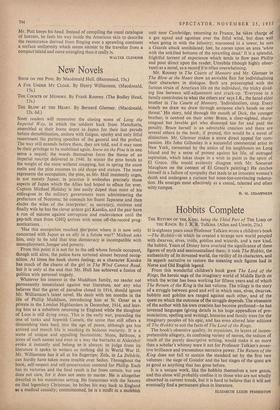New Novels
SNOW ON THE PINE. By Macdonald Hull. (Hammond, 15s.)
THE BLOW AT THE HEART. By Bernard Glemser. (Macdonald, 12s. 6d.) SOME readers will remember the closing scene of Long the Imperial Way, in which the soldiers back from Manchuria, assembled at their home depot in Japan for their last parade before demobilisation, endure with fatigue, apathy and only fitful resentment the parting speeches of the general and the prefect. The way still extends before them, they are told, and it may soon be their privilege to be mobilised again. Snow on the Pine is in one sense a sequel; the words themselves form the theme of an imperial rescript delivered in 1946. In winter the pine bends to the weight of the snow without snapping, but in spring the snow melts and the pine resumes its old shape and stature. The snow represents the occupation; the pine, as Mr. Hull insistently urges, is not merely Japan; in practice it embodies precisely those aspects of Japan which the Allies had hoped to efface for ever. Captain Michael Holiday is less easily duped than most of his colleagues in the military government team administering the prefecture of Nozomu; he conceals his fluent Japanese and then eludes the wiles of the interpreter; as secretary, mistress and finally wife he has the clever ardent girl Kasuko, and the pair have a run of success against corruption and malevolence until the pep-talk man from GHQ arrives with some off-the-record prog- nostications. • 'Has this occupation reached the point where it is now only concerned with Japan as an ally in a future war?' Michael asks him, only to be told that true democracy is incompatible with unemployment, hunger and poverty.
From this point it is not far to the cell whose female occupant, though still alive, the police have tortured almost beyond recog- nition. At times the book shows feeling; as a character Kasuko has much of the charm of the girl in The Wind Cannot Read, but it is only at the end that Mr. Hull has achieved a fusion of politics with personal tragedy.
Whatever his interest in the Maddison family, no reader not permanently innoculated against war literature, nor any who believes that the gates of paradise closed in 1914, should ignore Mr. Williamson's latest novel. He deals with ten months in the life of Phillip Maddison, introducing him at St. Omer as a private in the London Highlanders in December, 1914, and leav- ing him as a subaltern returning to England while the slaughter of Loos is still dying away. This is the early war, preceding the one of tanks and Sopwith Camels, the scene that still offers a diminishing vista back into the age of peace, although gas has arrived and trench life is reaching its hideous maturity. It is a scene of unique and appalling fascination; Mons, Bethune, a score of such names and even in a way the barracks at Aldershot evoke it instantly and belong to it always; to judge from its literature it spoke to writers as nothing did in World War II. Mr. Williamson has it all at his fingertips; Zola, in La Debacle, can hardly have taken more trouble over Sedan. Throughout the book, self-respect and self-preservation contend for Phillip. Each has its victories and the final result is far from certain, but one does not care, for it does not seem to matter. He is altogether dwarfed in his monstrous setting. He fraternises with the Saxons on that legendary Christmas; he bribes his way back to England as a medical casualty; commissioned, he is a misfit in a snobbish unit near Cambridge; returning to France, he takes charge of a gas squad and agonises over the fitful wind, but does well when going in with the infantry; marooned in a tower, he sees a Guards attack annihilated; lost, he comes upon an area 'white with the unkilted bottoms of the sprawling dead.' It is a splendid, frightful torrent of experience which tends to flow past Phillip and pour direct upon the reader. Unsubtle (though highly obser- vant) as a novel, as a record it is often overwhelming.
Mr. Rooney in The Courts of Memory and Mr. Glemser in The Blow at the Heart show an enviable flair for individualising their characters in dialogue. Both are preoccupied with the furious strain of American life on the individual, the tricky divid- ing line between self-adjustment and crack-up. 'Everyone in a family contributes to what the others are' says J.R., the hated elder brother in The Courts of Memory. 'Individualism, crap. Every breath we draw we draw through someone else's hands on our throat.' His story, told through the mouth of Dick, the younger brother, is centred on their sister Brace, a clear-sighted, sharp- tongued but lovable girl who dissented too far and paid the penalty. Brace herself is an admirable creation and there are several others in the book; if pruned, this would be a novel of distinction. Mr. Glemser makes a more direct appeal for com- passion. His John Gilhooley is a successful commercial artist in New York, tormented by the antics of his neighbours on Long Island and by a sense of protest against his life, of outraged aspiration, which takes shape in a wish to paint in the spirit of El Greco. (He would evidently disagree with Mr. Somerset Maugham on the content of El Greco's painting.) He catches himself in a failure of sympathy that leads to an innocent woman's death and undergoes a curious but none-too-convincing redemp- tion. He emerges most effectively as a casual, talented and often witty rumpot.
H. M. CHAMPNESS


























































 Previous page
Previous page